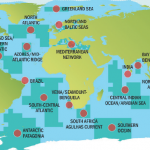The United Nations Agrees to Protect International Waters
For years, the United States has blocked international efforts to protect the ocean…or anything environmental (*cough* Kyoto Protocol) but on January 24, 2015 they joined the majority of countries in agreement to protect 64 percent of the world’s oceans.
In an effort to maintain biodiversity beyond national territorial waters, the proposed treaty would require environmental impact statements before any project is undertaken in open seas and implement a more collaborative regulation of high seas industries. It’s actions like these that may have saved a lot of heartache, and the lives of countless marine animals, during the Deepwater Horizon spill in 2006.
While the first sign of cooperation among international governments is encouraging, Environmental Science Lecturer Rus Higley warns, “Laws without teeth or too many exceptions are pointless… However the only way to fix it is to get started, so maybe [it’s] a good step.” The global community seems to agree that now is the time to act.
Social media exploded—# OceanLovers—during a four-day UN negotiations with almost 6,000 tweets, Facebook posts, and even “Dear John” letters written to U.S. Secretary of State John Kerry, urging the U.S. to take action. With the consequences of climate change evident around the world, communities have lost patience with the political dilly-dallying we’ve come to expect. Regardless of the majority in favor of protection however, Higley also states, “commons will always be abused.”
Biology professor Garrett Hardin explained the difficulty of managing commonly owned land (or in this case water) in his 1968 article describing the “tragedy of the commons.” The idea centers on the fact that people tend to function based on their own self-interest over the betterment of society as a whole. Therefore, commons are often degraded since there is no direct payoff for the individual to protect it.
The UN General Assembly must adopt the terms of the agreement by September 2015 for it to become legally binding under the United Nations Convention on the Law of the Sea (UNCLOS).






